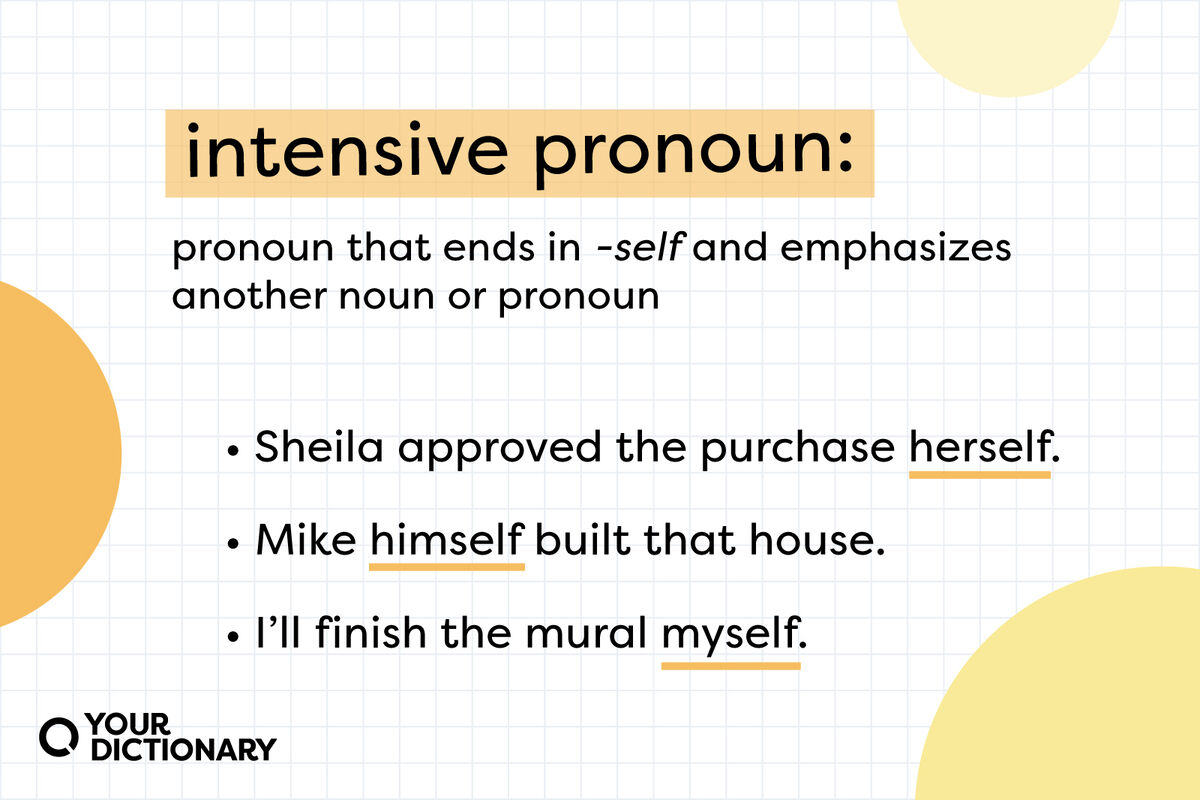
Intensive pronouns are the hype men of the grammar world. They think nouns are amazing, and they exist to tell everyone how great you (or he, or she, or they) are. All you need to do is put them in the right place — they’ll do all the talking.
What Is an Intensive Pronoun?
Intensive pronouns call attention to nouns and pronouns. Also called emphatic pronouns, intensive pronouns end in -self or -selves and direct more of a reader’s attention to the noun or pronoun in question.
- Mr. Thompson himself appeared in our student film.
- I myself don’t agree with the new policy.
- You yourself said that we should take this trip.
- Sheila approved the purchase herself.
Intensive pronouns don’t function like other types of pronouns because they emphasize nouns — they don’t replace them. If you can remove the intensive pronoun from the sentence without changing the meaning, you’re using it correctly.
List of Intensive Pronouns
Intensive pronouns only work if they’re paired with the correct personal pronouns. Just find the corresponding pronouns on a list of intensive pronouns to get it right.
|
Personal Subject Pronoun |
Intensive Pronoun |
|
I |
myself |
|
you (singular) |
yourself |
|
you (plural) |
yourselves |
|
he |
himself |
|
she |
herself |
|
it |
itself |
|
they (singular) |
themself |
|
they (plural) |
themselves |
|
we |
ourselves |
If themself is an unfamiliar word for you, there’s a reason — it’s only been in the dictionary since 2019. Themself is a grammatically acceptable intensive pronoun that corresponds to the singular they/them.
How To Use Intensive Pronouns
There’s only one way to use an intensive pronoun: to intensify a noun or pronoun. But there are a few different places they can appear in a sentence. Check out several intensive pronoun example sentences to see how they really work.
Examples of Intensive Pronouns After a Noun or Pronoun
Writers often place intensive pronouns right after the antecedent noun or pronoun. This placement emphasizes the importance of the noun performing the verb.
- I myself think the president is doing a great job.
- The fly itself found its way out the window.
- You yourself assured me that the project was finished.
- Mike himself built that house.
- Mayor Edwards herself appeared at the fundraiser.
- The band members themselves admitted to creative differences.
Examples of Intensive Pronouns at the End of a Sentence
You can also add an intensive pronoun to the end of a sentence, but only if its antecedent is clear (and matches the pronoun). In these cases, the intensive pronoun emphasizes “This is the person who did this.”
- I’ll finish the mural myself.
- Did you design this image yourselves?
- Ollie cleaned up the mess themself.
- We planned the wedding ourselves.
Intensive Pronouns vs. Reflexive Pronouns
Both intensive pronouns and reflexive pronouns end in -self or -selves, making them nearly identical — except for the ways they function in a sentence.
While intensive pronouns draw attention to nouns or pronouns, reflexive pronouns act as objects in a sentence (nouns that receive the verb’s action, or nouns that receive the direct object). They refer to the same noun as the subject of the sentence.
- Intensive pronoun - I made the cake myself. (I am the one who made the cake.)
- Reflexive pronoun - I made the cake for myself. (I made the cake, and I received the cake.)
- Intensive pronoun - The artist created the sculpture herself. (The artist was the one who made the sculpture.)
- Reflexive pronoun - The artist created a sculpture by herself. (The artist worked alone on the sculpture.)
- Intensive pronoun - Mike and Joan themselves bought a new house. (Mike and Joan were the people who bought the house.)
- Reflexive pronoun - Mike and Joan bought themselves a new house. (They bought a house, and they received the house.)
Note that if you remove the intensive pronoun from the sentence, the sentence still makes sense and is grammatically correct. You can’t remove a reflexive pronoun without changing the meaning of the sentence.
Where Do Intensive Pronouns Come From?
The concept of intensive pronouns doesn’t fit with traditional English grammar rules — so why do we have them? We have Latin to thank for that.
English intensive pronouns come from the Latin intensive pronoun ipse, as in the Latin phrase ipso facto (“by the fact itself” — see the self right there?). Ipso intensifies the noun facto (“fact”) in a sentence to mean something like “therefore.”
- If you help someone commit a crime, ipso facto, you are guilty too.
- The person who used the car last ipso facto should fill it up with gas.
The Origin of “Self”
The concept of intensive pronouns comes from Latin, but the actual word self comes from the Old English self and German selb. The words my, your, his, her, them, it, and our were added to the word centuries later.
Grammar Can Be Pretty Intense
Even though intensive pronouns make your nouns more intense, they shouldn’t be intimidating — and neither should other parts of grammar. Keep yourself open to new grammar ideas with a list of the grammar rules you actually can break, or the most common mistakes that a proper grammar education can help you avoid.